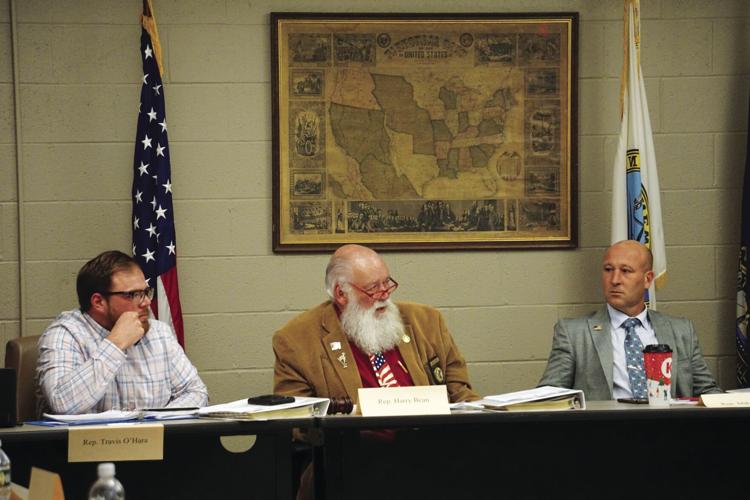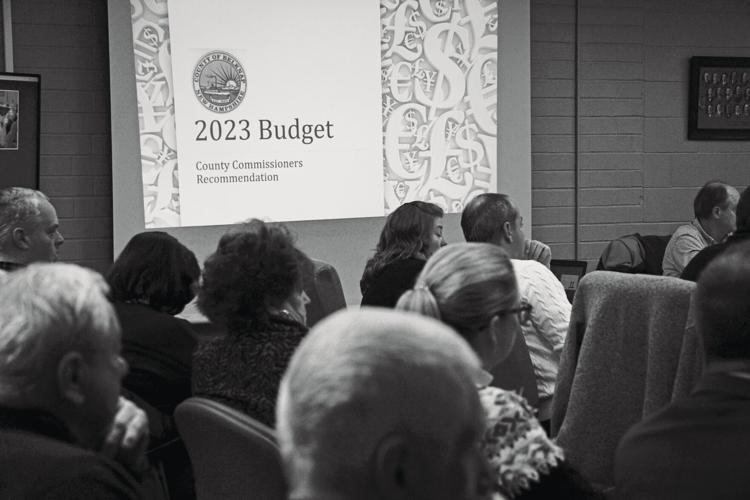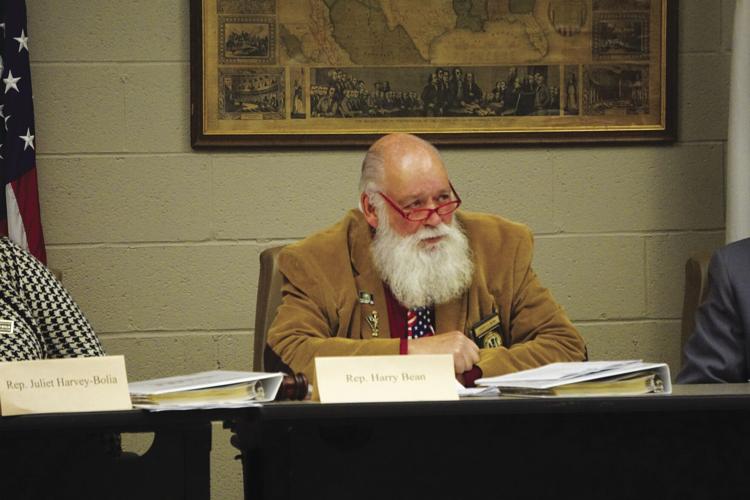LACONIA — A new team of officers will join returning Chair Harry Bean (R-Gilford) in leading the Belknap County Delegation. Reps. Mike Bordes (R–Laconia) and Travis O’Hara (R–Belmont) were elected vice chair and clerk Monday night at the first delegation meeting since legislators were sworn in last week.
Though the delegation is still soundly controlled by the GOP, with three newly elected Democrats, six newly elected Republicans and nine returning incumbent Republicans, its new leadership makeup reflects the balance of power shift brought about by fall elections. The delegation is made up of the representatives elected to serve the towns and cities in Belknap County.
Bordes and O’Hara — both vocal critics of past delegation leadership led by former Rep. Mike Sylvia (R–Belmont) — will join Bean and Reps. Juliet Harvey-Bolia (R–Tilton) and David Huot (D–Laconia), selected as at-large members, on the delegation’s executive committee. Several representatives — including Reps. Paul Terry and Barbara Comtois, both Republicans from Alton — opted to abstain from officer elections.
Bean was first elected chair in September after Sylvia stepped down from the role after the summer turmoil at Gunstock Mountain Resort. Bean was reelected at Monday’s meeting with no competing nominations.
In an interview, Bean said that he wanted to see a range of perspectives included in leadership, “and I think we did that,” he said. He described the executive committee members as middle of the road.
“None are extremists — from either side,” he continued. "We have work to do, and I'm ready to work everyone."
Lingering Gunstock tensions
As the delegation finds its footing in the new term, the new leadership seized the moment to begin righting what it perceived as a major lingering wrong of the past officers.
In a contentious dispute with previous members of the Gunstock Area Commission, Sylvia accused three former commissioners of illegal actions to oust a fellow commissioner appointed by Sylvia. Ahead of a potential removal hearing — the delegation is charged with appointing and removing members of the GAC, which serves as a kind of board of directors for the county-owned mountain — the then-commissioners targeted by Sylvia took legal action against the delegation.
In facing the suit, Sylvia asked then-Rep. Norm Silber (R-Gilford) — Sylvia and Silber both lost their bids for re-election in the primary — to serve with him as a two-member “control group” in charge of communications with the delegation’s legal firm, Cleveland, Waters & Bass.
Because the full delegation was excluded from conversations with the firm, Silber said at a May delegation meeting, the communications could be shielded from Right to Know requests to make them public — including from The Daily Sun and from Matt Coker, a Meredith Democrat elected in November to serve on the delegation.
The delegation had approved $20,000 to cover legal costs. Sylvia and Silber did not disclose to the full delegation that fees had exceeded this amount until they doubled that cap, and the final tally came in at $50,000. What kind of engagement ran up such a total, and whether the control group went outside of the scope of the original suit, remains a matter of speculation by the rest of the delegation and the public.
During the “other business” item on the agenda — which O’Hara had proposed be added at the beginning of the meeting — O’Hara made a motion that Cleveland, Waters & Bass “put together a packet of all communications related to Gunstock with the bill for the legal matters” for the new delegation so that it could “make a decision on how we handle communications going forward.”
Terry, who often sided with Silber and Sylvia, proposed that the motion be tabled to the next meeting. He criticized O’Hara for not being upfront about his intention to make such a motion when he added “other business” to the agenda.
“Going forward, it would engender a higher degree of trust,” Terry said, “if somebody wants to bring something up under a topic of other business and they know what they want to bring up, that they specify what it is ... instead of [others] being surprised at the end of the meeting.”
Tabling would ensure that new delegation members were prepared to make an informed vote and that both new and returning members were not blindsided the matter, Terry noted. The motion to table passed, 11-6.
Though he voted in favor of delaying it, Bean said in an interview that he supports O’Hara’s motion.
“There’s a lot of people out there that want to know what we spent that $50,000 on,” Bean said. “We can’t tell them unless we get that information” from the firm.
“We were told [by Syliva and Silber] that we were going to see the smoking gun,” Bean said. “There was no smoking gun ... and now it looks like we spent $50,000 on nothing.”
County budget
Headlining the agenda for the delegation was a review of the proposed 2023 budget. County government structure tasks the board of commissioners, led by Chair Peter Spanos, with developing a proposed budget for county departments but assigns the delegation final control over the purse strings.
The budget includes a 6.6% increase in spending, about $2 million. About half of that increase, according to the commissioners’ presentation, is related to contractual obligations already approved by the delegation. The remaining amount is attributable to wage and benefit increases totaling about $170,000, information technology projects previously covered by American Rescue Plan Act funding and overall cost jumps due to inflation.
Because of a 10.6% drop in county revenue — largely attributable to the loss of ARPA funding and the drop in revenue brought in by the county nursing home from vacancies — and because the proposed budget includes no applied fund balance, county taxes would rise 35%, or $124 on a $300,000 home.
For the past two years, the delegation has hollowed the county’s fund balance — a non-cash account most frequently used to cover unexpected or emergency expenses — to keep taxes low and cover regular county expenses. The fund balance has dropped from $5.6 million in 2020 to less than $2.5 million currently. The target minimum figure is $3.5 million.
“Any changes in the tax rate affect all of us, so we take these things very seriously,” Spanos said. “But we feel that we’ve presented a budget to you that is workable, reasonable and about as low as we can make it without making additional cuts and imperiling future services in all the departments.” He encouraged the representatives to have an open and communicative partnership with commissioners during the review process.
Spanos emphasized that the budget increase was “still substantially lower than the current rate of inflation,” and asserted that there was little room for cuts.
“We made cuts where we felt they could be made, but essentially there wasn’t much we could take out from the different line items... [and maintain] full services here in the county,” Spanos said.
Bean proposed that three committees of six distinct representatives be formed to review portions of the budget, divided by department, with a diversity of viewpoints appearing in each committee. This would ensure all 18 members had a voice in budget review and that the process was balanced, he said.
“I want to include as many people as possible. I want a cross-section of viewpoints,” Bean said, rather than a small group, which in the past was the Executive Committee, spearheading review and fielding budget questions from other representatives.
Several members of the delegation were apprehensive about this approach and expressed concerns that it would pose challenges to the budget timeline and become disorganized.
County Administrator and Human Resources Director Debra Shackett echoed these concerns and supported the approach where the executive committee serves as a budget committee.
“In 15 years I’ve watched this process,” Shackett said. “The consistency from department to department just makes it go more efficiently when there’s one group rather than having to go through [everything] with every single department.” Getting everyone’s perspective is important, she said, but all budget review meetings between departments and the committee would be open to the public as well as the full delegation.
The group did not come to a conclusion as to its process for reviewing the budget, delaying its potential approval into January. The new fiscal year starts on Jan. 1 and the delegation must approve a budget by April 1. The delegation set a meeting to revisit the budget approach question for Tuesday, Jan. 10.
Gunstock Commission appointments
Comtois noted that the original call for applications to join the GAC incorrectly included a property ownership qualification. An update to Gunstock’s governing statute only requires that commissioners be county residents. The large section of the county who are residents but do not own property, Comtois said, were excluded from potentially applying by the original posting.
The delegation agreed to extend the application period to Monday, Jan. 9, allowing a comparable time period for a correct posting to be issued and for any additional applications to be submitted. The delegation will select new commissioners at a meeting on Wednesday, Jan. 18.
Two seats on the commission have remained vacant since August, when the turmoil at Gunstock saw the resignation of three commissioners, only one of whom has since been replaced.




















(0) comments
Welcome to the discussion.
Log In
Keep it Clean. Please avoid obscene, vulgar, lewd, racist or sexually-oriented language.
PLEASE TURN OFF YOUR CAPS LOCK.
Don't Threaten. Threats of harming another person will not be tolerated.
Be Truthful. Don't knowingly lie about anyone or anything.
Be Nice. No racism, sexism or any sort of -ism that is degrading to another person.
Be Proactive. Use the 'Report' link on each comment to let us know of abusive posts.
Share with Us. We'd love to hear eyewitness accounts, the history behind an article.